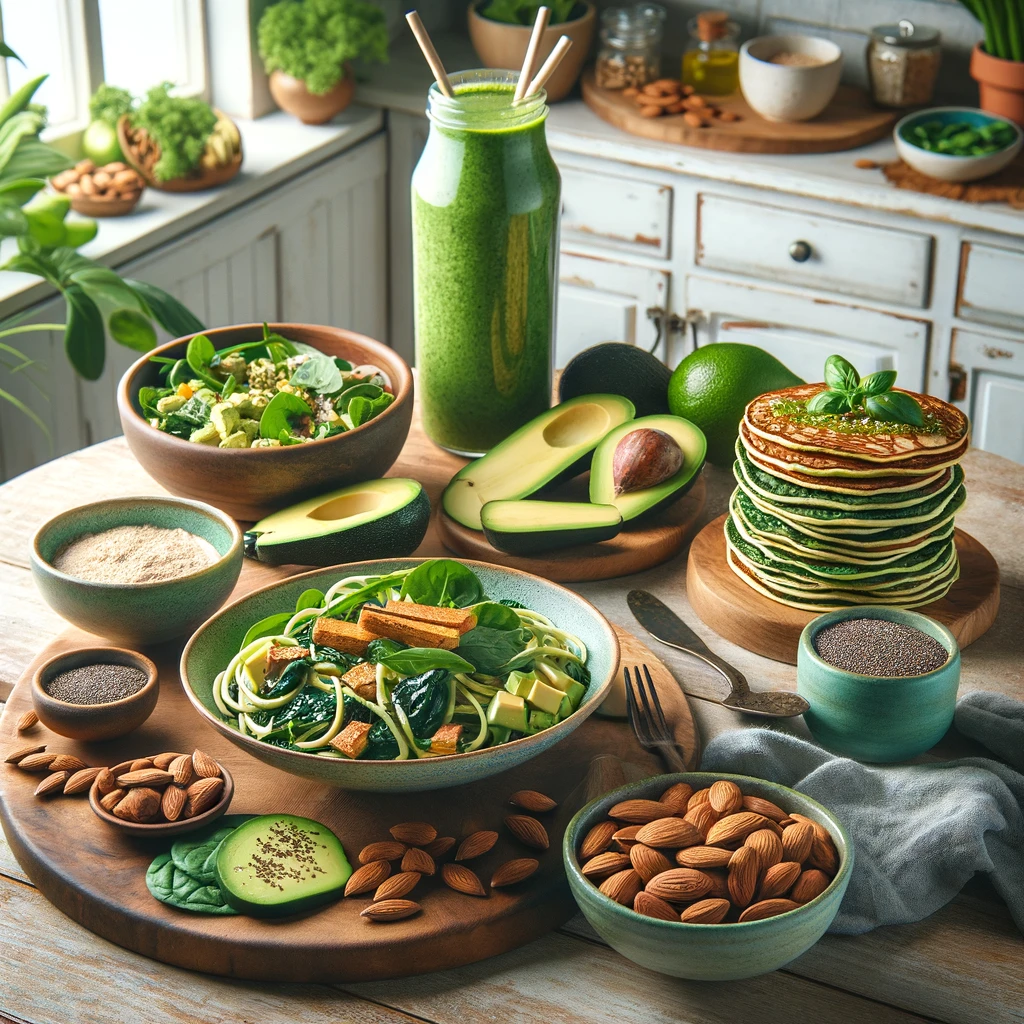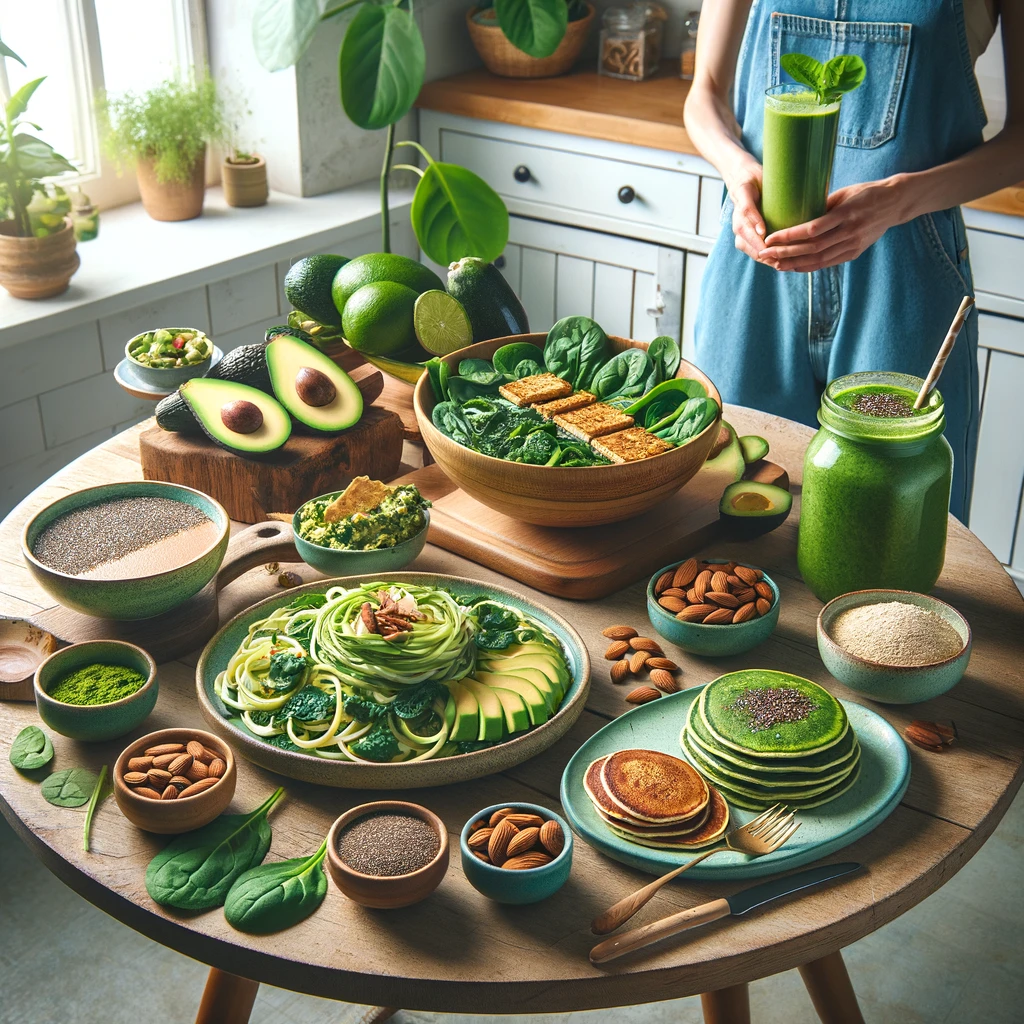Embarking on a keto vegan journey blends the environmental and health virtues of a plant-only diet with the metabolic benefits of ketosis. Marrying these two dietary styles—high-fat, low-carb and entirely plant-based—may seem daunting at first, but the rewards in health, energy, and sustainability are significant. We’ll explore how to develop a keto vegan diet plan that is not only effective but also enjoyable and rewarding.
Understanding the Keto Vegan Diet
The ketogenic diet focuses on high-fat, moderate-protein, and low-carbohydrate consumption to induce ketosis, a metabolic state where fat is utilized as fuel instead of carbohydrates. Merging this with veganism necessitates meticulous planning to meet all nutritional requirements using plant-based sources.
Why Choose a Keto Vegan Lifestyle?
Choosing a keto vegan lifestyle presents the optimal blend of the health benefits of a ketogenic diet, like better blood sugar management and weight reduction, with the ethical and environmental perks of veganism. But how can one ensure sufficient nutrient intake while following both diets? The answer is strategic meal planning and a thorough knowledge of plant-based, keto-friendly foods.
Building Your Keto Vegan Pantry
Begin by stocking up on essentials for a keto vegan kitchen:
- Nuts and seeds (almonds, chia seeds, flaxseeds)
- Low-carb vegetables (spinach, kale, zucchini)
- Healthy fats (avocado, coconut oil, olive oil)
- Plant-based proteins (tofu, tempeh, seitan)
- Dairy alternatives (unsweetened almond milk, coconut cream)
Crafting Balanced Meals
A balanced keto vegan meal should include a protein source, an abundance of low-carb vegetables, and healthy fats. For example, a stir-fry featuring tofu, mixed greens, and a liberal splash of olive oil meets all nutritional bases.
Staying Hydrated and Supplementing Wisely
Staying hydrated is crucial in any diet, particularly in a keto vegan regimen. Additionally, consider supplements like vitamin B12, omega-3 (from algae), and vitamin D to address any dietary shortfalls.
Keto Vegan Meal Ideas

Begin your day with low-carb, nutrient-rich meals like avocado spinach smoothies or chia pancakes made with almond flour. These meals are satisfying and keep you within keto guidelines.
For lunch, opt for robust salads with nuts, seeds, and avocado or zucchini noodles dressed with pesto and tempeh. These dishes not only provide nutrients but also maintain ketosis.
Dinner invites creativity with dishes such as eggplant lasagna or a coconut curry served over cauliflower rice. Balancing flavors and textures is key to creating fulfilling meals.
Smart snacking is vital on a keto vegan diet. Options like coconut yogurt, macadamia nuts, or homemade keto bars can stave off hunger without increasing carb intake.
Navigating restaurants and social events can be challenging on a keto vegan diet. Seek out salad bars and vegetable-centric dishes, and feel free to request modifications.
Overcoming Challenges
Limited Food Variety
A common challenge for those on a keto vegan diet is the perceived lack of food variety, especially for those used to a conventional diet. Overcoming this challenge involves creativity and exploration.
- Explore International Cuisines: Many global cuisines feature dishes that are naturally low in carbs and rich in plant-based fats and proteins, like various Indian vegetarian options that fit keto parameters.
- Experiment with New Recipes: Utilize the vast array of keto vegan recipes online to keep your diet exciting and diverse.
Potential Nutrient Deficiencies
A carefully planned keto vegan diet can provide all necessary nutrients, though it demands conscious planning to avoid deficiencies in key vitamins and minerals, like Vitamin B12, iron, and omega-3 fatty acids.
- Incorporate Nutrient-Dense Foods: Emphasize a range of nutrient-rich foods in your diet, such as leafy greens, seeds, nuts, and tofu.
- Consider Supplementation: Supplements can help bridge any nutritional gaps. Consult a healthcare provider to identify which supplements are beneficial for you.
The Importance of Meal Prep
Meal prepping is essential on a keto vegan diet, saving time and ensuring you have keto-friendly meals readily available.
- Plan Your Meals: Begin by planning your weekly meals to streamline grocery shopping and guarantee you have all necessary ingredients.
- Batch Cook: Prepare large portions of staples like cauliflower rice, zucchini noodles, or vegan keto bread to use throughout the week.
- Snack Preparation: Keep keto vegan snacks on hand to prevent hunger pangs and avoid non-keto temptations.
Staying Motivated
Maintaining motivation can be tough, especially when progress slows or social situations emphasize dietary restrictions.
- Join a Community: Engage with online forums, social media groups, and local meet ups to connect with others on the same journey, offering support and sharing recipes.
- Set Realistic Goals: Setting achievable short-term goals can help maintain focus and provide a sense of accomplishment, driving further success.
* Celebrate Your Wins: Acknowledge your dietary adherence, mastery of new recipes, or fitness achievements to boost motivation.
Monitoring Your Health
Regular monitoring of your health indicators and overall well-being is vital to ensure your keto vegan diet meets your nutritional needs.
- Listen to Your Body: Be attentive to how you feel. Signs like fatigue or brain fog may indicate nutritional deficiencies or the need for macro adjustments.
- Regular Check-ups: Frequent health examinations can provide insights into how your diet impacts your overall health and guide necessary dietary adjustments.
- Adapt as Needed: Be prepared to modify your diet based on health indicators and personal well-being. Flexibility is crucial in achieving a balance that works for you.
Embracing a Keto Vegan diet plan as Lifestyle
Adopting a keto vegan diet plan offers a fulfilling challenge that benefits your health, the environment, and animal welfare. With thoughtful planning and inventive meal ideas, you can enjoy a varied, nutritious, and appetizing diet that aligns with your ethical and health objectives.
FAQs
- Is getting enough protein on a keto vegan diet feasible? Absolutely! Concentrate on high-protein plant-based foods like tofu, tempeh, and seitan.
- How can I ensure I’m receiving sufficient vitamins and minerals? Include a variety of foods and consider supplementation for nutrients that are harder to obtain, like B12 and omega-3.
- Can I still enjoy desserts on a keto vegan diet? Yes! Many keto-compatible, plant-based dessert recipes utilize ingredients like almond flour, coconut cream, and stevia.
- What if I feel tired or lethargic? This may occur during the initial adjustment phase. Ensure proper hydration and electrolyte balance, and consider adjusting your carb intake slightly.
- How can I stay keto vegan when eating out? Opt for vegetable-based dishes, request modifications, and look for eateries with keto or vegan options.
Sharing is Caring!
